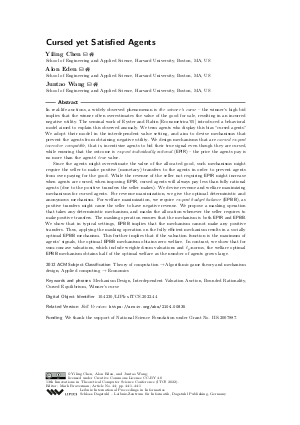Cursed yet Satisfied Agents
Authors Yiling Chen, Alon Eden, Juntao Wang
-
Part of:
Volume:
13th Innovations in Theoretical Computer Science Conference (ITCS 2022)
Part of: Series: Leibniz International Proceedings in Informatics (LIPIcs)
Part of: Conference: Innovations in Theoretical Computer Science Conference (ITCS) - License:
 Creative Commons Attribution 4.0 International license
Creative Commons Attribution 4.0 International license
- Publication Date: 2022-01-25
File

PDF
LIPIcs.ITCS.2022.44.pdf
- Filesize: 331 kB
- 1 pages
Document Identifiers
Related Versions
- Full Version https://arxiv.org/abs/2104.00835
Subject Classification
ACM Subject Classification
- Theory of computation → Algorithmic game theory and mechanism design
- Applied computing → Economics
Keywords
- Mechanism Design
- Interdependent Valuation Auction
- Bounded Rationality
- Cursed Equilibrium
- Winner’s curse
Metrics
- Access Statistics
-
Total Accesses (updated on a weekly basis)
0PDF Downloads0Metadata Views
Abstract
In real-life auctions, a widely observed phenomenon is the winner’s curse - the winner’s high bid implies that the winner often overestimates the value of the good for sale, resulting in an incurred negative utility. The seminal work of Eyster and Rabin [Econometrica'05] introduced a behavioral model aimed to explain this observed anomaly. We term agents who display this bias "cursed agents." We adopt their model in the interdependent value setting, and aim to devise mechanisms that prevent the agents from obtaining negative utility. We design mechanisms that are cursed ex-post incentive compatible, that is, incentivize agents to bid their true signal even though they are cursed, while ensuring that the outcome is ex-post individually rational (EPIR) - the price the agents pay is no more than the agents' true value. Since the agents might overestimate the value of the allocated good, such mechanisms might require the seller to make positive (monetary) transfers to the agents in order to prevent agents from over-paying for the good. While the revenue of the seller not requiring EPIR might increase when agents are cursed, when imposing EPIR, cursed agents will always pay less than fully rational agents (due to the positive transfers the seller makes). We devise revenue and welfare maximizing mechanisms for cursed agents. For revenue maximization, we give the optimal deterministic and anonymous mechanism. For welfare maximization, we require ex-post budget balance (EPBB), as positive transfers might cause the seller to have negative revenue. We propose a masking operation that takes any deterministic mechanism, and masks the allocation whenever the seller requires to make positive transfers. The masking operation ensures that the mechanism is both EPIR and EPBB. We show that in typical settings, EPBB implies that the mechanism cannot make any positive transfers. Thus, applying the masking operation on the fully efficient mechanism results in a socially optimal EPBB mechanism. This further implies that if the valuation function is the maximum of agents' signals, the optimal EPBB mechanism obtains zero welfare. In contrast, we show that for sum-concave valuations, which include weighted-sum valuations and 𝓁_p-norms, the welfare optimal EPBB mechanism obtains half of the optimal welfare as the number of agents grows large.
Cite As Get BibTex
Yiling Chen, Alon Eden, and Juntao Wang. Cursed yet Satisfied Agents. In 13th Innovations in Theoretical Computer Science Conference (ITCS 2022). Leibniz International Proceedings in Informatics (LIPIcs), Volume 215, p. 44:1, Schloss Dagstuhl – Leibniz-Zentrum für Informatik (2022)
https://doi.org/10.4230/LIPIcs.ITCS.2022.44
BibTex
@InProceedings{chen_et_al:LIPIcs.ITCS.2022.44,
author = {Chen, Yiling and Eden, Alon and Wang, Juntao},
title = {{Cursed yet Satisfied Agents}},
booktitle = {13th Innovations in Theoretical Computer Science Conference (ITCS 2022)},
pages = {44:1--44:1},
series = {Leibniz International Proceedings in Informatics (LIPIcs)},
ISBN = {978-3-95977-217-4},
ISSN = {1868-8969},
year = {2022},
volume = {215},
editor = {Braverman, Mark},
publisher = {Schloss Dagstuhl -- Leibniz-Zentrum f{\"u}r Informatik},
address = {Dagstuhl, Germany},
URL = {https://drops.dagstuhl.de/entities/document/10.4230/LIPIcs.ITCS.2022.44},
URN = {urn:nbn:de:0030-drops-156407},
doi = {10.4230/LIPIcs.ITCS.2022.44},
annote = {Keywords: Mechanism Design, Interdependent Valuation Auction, Bounded Rationality, Cursed Equilibrium, Winner’s curse}
}
Author Details
Funding
We thank the support of National Science Foundation under Grant No. IIS-2007887.
